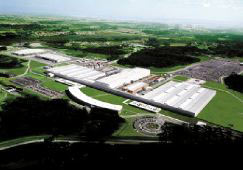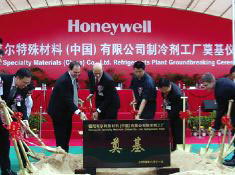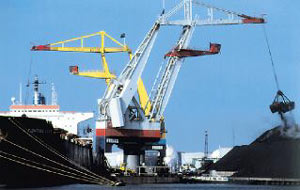|

Automakers Revving Up
South American Production Several major European auto builders
plan to increase or resume production in South America’s two largest countries.
The projects will serve the Mercosur market.
Renault is investing US$70 million in a new production
line at its facility in Parana, Brazil, to manufacture its new Megane Sedan
II model, a restyling of earlier models. Renault plans to initially produce
20,000 vehicles annually with a market launch set for late 2005. Renault
currently claims about 4 percent of the Brazilian automobile market.
 |
Renault plans to manufacture its new Megane Sedan II at its plant
in Parana, Brazil. The French company is investing US$70 million in
a new production line. |
In Argentina, PSA Peugeot Citro?n plans to launch
two models at the group’s Buenos Aires plant, where the Peugeot 206, 307
and Partner and the Citro?n Berlingo are currently manufactured. Production
is expected to begin by 2007. The company also plans to boost output at
its Jeppner, Argentina, facility, which makes engines and other mechanical
components.
Peugeot says it is adding the models in response
to the improving Argentine economy. The new models will be exported to other
Mercosur countries as well as to other Latin American markets. The company
says annual output at the Buenos Aires plant will rise from 45,000 cars
this year to 100,000 in 2007. The plan will create more than 1,000 jobs
at the two facilities, in addition to 300 already hired in 2004. Total investment
will be 450 million Argentine pesos (US$150 million).
Published reports in Argentina indicate Fiat
may soon resume production at its plant in the central province of Cordoba.
Fiat halted production there in 2002 while in the midst of a financial crisis.
The company is considering manufacturing the latest version of the Siena
at the plant.
Kia Building on Popularity in Iran
Kia,
the leading car brand in Iran with 32 percent of market share, says its
Rio compact sedan will be assembled and sold in the Iranian market beginning
in early 2005. Under the agreement with Iranian partner Saipa Corp., Saipa
will assemble the Rio on a knockdown basis from disassembled kits exported
by Kia.
Saipa plans to boost capacity at its Tehran
plant with new production facilities. Kia began its knockdown business
in Iran with Saipa in 1993. Since then, more than 740,000 Kia Prides have
been assembled and sold in Iran.
 |
Honeywell is building a manufacturing plant for
non-ozone- depleting refrigerant products in Qingpu, Shanghai, China.
The plant will open by the end of the year. Richard Preziotti, Honeywell
Chemical’s vice president and general manager, is fifth from right. |
Honeywell Set to Open
Refrigerant Plant in China
Honeywell is building a manufacturing plant for
non-ozone-depleting refrigerant products in Qingpu, Shanghai, China. The
company says the facility will be operational by the end of 2004. While
Honeywell officials have not disclosed the size of the investment,
they say it follows a recent increase in HFC (hydrochloroflurocarbon)
manufacturing capacity in the U.S., which included more than $200 million
in new capital investment.
The new facility is part of an overall Honeywell
Specialty Materials plan for growth in the Asia Pacific region.

Swiss Swigging On New Energy Drink Plant
The Rauch Group of Austria plans to build a new factory
to produce the Red Bull energy drink in Widnau, St. Gallen, Switzerland.
The plant will open in late 2005 and will employ about 80 to produce more
than 65 million drinks per year. The plant is the latest cooperation between
Rauch and Red Bull. Rauch is one of the largest producers of juices in
Austria.
Two Plants Take Opposite
Tacks on Absolutely Smoking Market Fertin Pharma has opened the world’s largest
medical chewing gum plant in Vejle, Denmark. The company, which works
in partnership with some of the world’s largest pharmaceutical manufacturers,
invested US$90 million in the facility, which includes 86,000 sq. ft.
(7,990 sq. m.) of manufacturing space.
The plant, which has been approved by the U.S.
Food & Drug Administration to serve the U.S. market, will employ 200 to
produce its MediChew tablets, produced with such partners as Novartis
and GlaxoSmithKline. The U.S. market represents about half of the global
market for pharmaceutical gum. Fertin Pharma sells its tablets in 24 countries
and U.S. sales exceeded $20 million in 2003, led by sales of smoking cessation
products.
In a less health-conscious era, the saying
went, “Smoke ’em if you’ve got ’em.” In China, they’ve certainly got plenty
of smokers. The World Health Organization reports that two-thirds of all
adult males in China are smokers.
So, it’s no surprise that British American
Tobacco (BAT) officials would light up at the prospect of a proposed joint
venture that would serve that king-size market with a $1.8-billion plant,
the London-based company’s largest. BAT’s partner to be is China Eastern
Investments Corporation Limited. The factory would have an annual capacity
of 100 billion cigarettes. A location has not been announced.
|
|
Fertin Pharma’s new high-tech plant in Denmark will serve the medicinal
gum market in the U.S. |
Shortly after BAT made the announcement, Chinese
government officials, including the State Tobacco Monopoly Administration,
denied that BAT had received permission. However, BAT Chairman Jan du Plessis
expressed confidence the deal would eventually proceed.
 |
Major recent expansions by two coal trans-shipment
companies at the Port of Amsterdam will help supply Germany’s growing
need for imported coal. Coal production in Germany has declined for
years with many mines closing. |
Amsterdam Port
Handling More Coal
Overslag Bedrijf Amsterdam (OBA) is expanding
on the former Ford site, adding an extra 9 hectares (22.2 acres). Amsterdam
Coal Processing is adding 3.5 hectares (8.6 acres). The expansions increase
port trans-shipment capacity by 3 million tons and provide extra storage
capacity for more than half a million tons.
The port has long been a focal point for coal
storage and trans-shipment: Coal accounts for about 30 percent of all
trans-shipped goods. Much of it is 
pre-processed at the port before leaving.
Much of the coal goes to steel manufacturer Corus; various Dutch electricity
generating stations, such as the Hemwegcentrale, which provides Amsterdam’s
electricity; and to users in the German hinterland, particularly in the
Ruhr region. 
|








